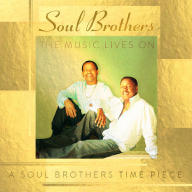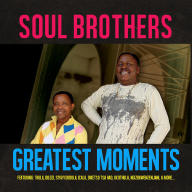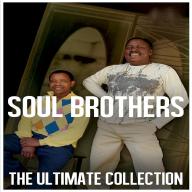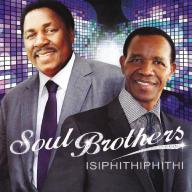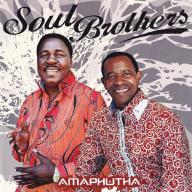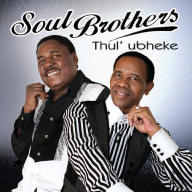The Soul Brothers
from South Africa
Biography
Few bands last 30 years. Even fewer help define a country's music the way the Soul Brothers have that of South Africa. Their particular take on mbaqanga -- the ubiquitous township jive -- has made them stars in their homeland, with more than 30 albums covering their time. Singer David Masondo and keyboardist Moses Ngwenya have been playing together since 1976, but the genesis of the Soul Brothers goes back further, to the Groovy Boys, a 1970 Natal band where Masondo was the drummer. It didn't last, but Masondo, bassist Zakes Mchunu, and guitarist Tuza Mthethwa kept the music alive while working in a factory. In 1974 they made a leap of faith, 600 miles to Johannesburg, seeking fame and fortune, neither of which arrived quickly. They played sessions, accompanied other bands, all the while working on their own sound, and taking on the name the Soul Brothers -- a very apt moniker for a bunch more influenced by American soul than the prevailing British pop trend, mixing it with the township jive they'd grown up hearing. The turning point came in 1976, when Ngwenya joined, bringing his Hammond B3 organ sound into the mix, and rhythm guitarist American Zulu also came into the fold. Suddenly the chemistry was perfect, as their first two singles, Mshoza Yami and Mama Ka S'Bongile, showed, both becoming massive South African hits. They were flying high; but suddenly came an Icarus-like descent, as founder Mthethwa died in an auto accident in 1979, then Zulu quit in 1982. However, the band went on to release Isiphiwo, which sold more than 200,000 copies -- bouncing back very well. But they seemed dogged by bad luck. No sooner had they signed with Priority Records and released Isicelo, a massive hit album, when Mchunu also became a fatal victim of a car wreck in 1984. For a while it seemed as if the Soul Brothers would just quit. But Masondo and Ngwenya decided to continue, drafting in new personnel (Maxwell Mngadi, lead guitar; Sicelo Ndlela, bass), and going back into the studio and keeping a prolific release schedule throughout the '80s, with at least one album a year. Their sound even made it out of South Africa, when England's Earthworks released the compilation Jive Explosion, which covered their hits of the last decade. Using that as a springboard, they even toured overseas, in Europe and the U.S., playing the ceremony in Olso when Nelson Mandela and F.W. deKlerk were jointly awarded the Nobel Peace Prize. The result of being on the road was that they released no album in 1990, but more than made up for it the following year, when no less than 13 Soul Brothers albums -- a figure that included reissues -- made it to the shelves., with seven more in 1994. From 1995 on, the band more or less owned the South African Music Association award for best mabaqanga album, winning it for six straight years. Ngwenya has also issued solo records. In 2001, Rough Guide to the Soul Brothers offered a capsule overview of their career. ~ Chris Nickson, Rovi
Top Tracks
Albums
Videos
Close


